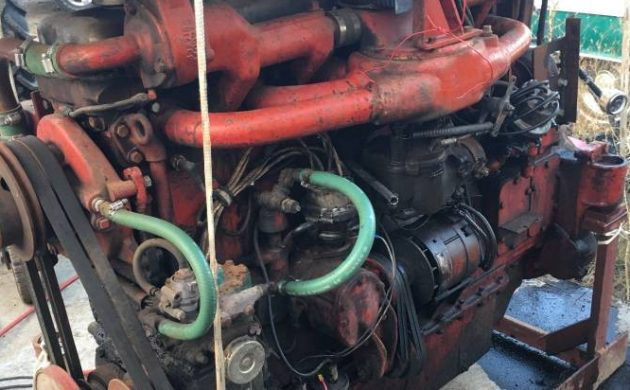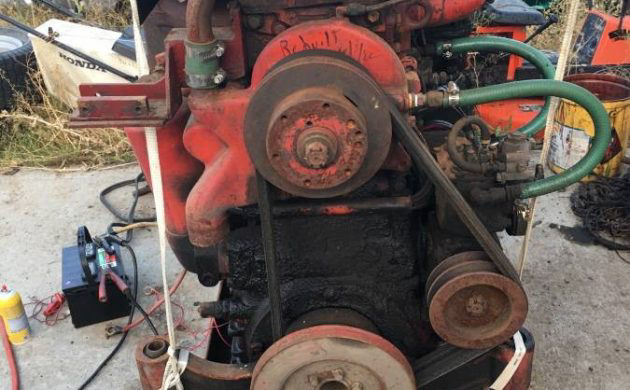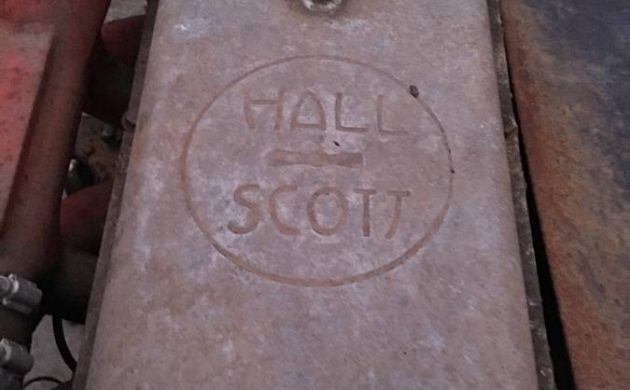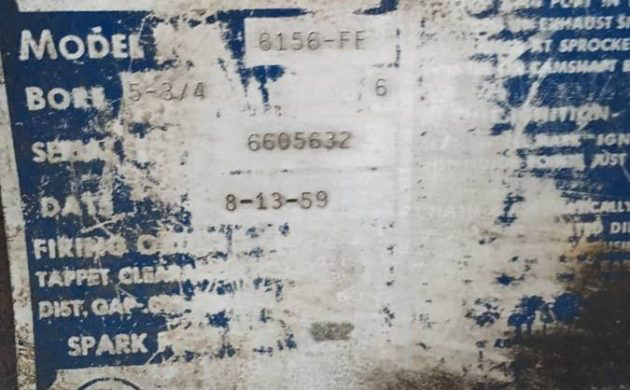Serious Big Block: 1959 Hall-Scott 6156-FE Engine
We’ve all seen plenty of big-block engines during our life, but this Hall-Scott could be one of the biggest that you are ever likely to see. This beauty has a capacity of 935ci, which is pretty impressive. If you fancy getting your hands on a serious engine, you will find the Hall-Scott located in Yakima, Washington, and listed for sale here on Craigslist. The owner is asking $5,000 for this unusual piece of equipment.
The first thing that I will say about this monster engine is that it actually does run. It is mounted on a frame, and while it has no radiator or generator, it does come with its original Dana transmission, which is currently disassembled. It is believed that the engine originally saw duty in a Kenworth fire-fighting appliance, which would sound about right. These were a favorite for this application because the OHC 6-cylinder engine not only produced around 280hp, but an incredible 800ft/lbs of torque. A second characteristic that explained their popularity for this application was the fact that the engine featured a dual ignition system, providing great reliability.
The 6156 was by no means the largest engine produced by Hall-Scott, nor was it the most powerful. The ultimate in that department would have to be the V12 Defender. With a capacity of up to 2,281ci, this monster, which was primarily designed for marine use, pumped out in excess of 700hp. One of the interesting characteristics of the 6156 was that it had a real propensity to shoot flames out the exhaust on over-run. This seems like an odd thing to encounter when you picture the engine fitted to a fire-fighting appliance racing out to save a burning building, or to quench a wildfire.
The Hall-Scott 6156-FE was a great engine that served its purpose extremely well. However, the ongoing development of diesel engines eventually saw the Hall-Scott petrol engines become redundant. This one is a good one, and the fact that it runs is a real bonus. I have found a number of examples for sale at present for around the same asking price as this one, but most of those have been sitting idle for a number of years. So, if someone is considering undertaking the restoration of a classic truck or fire-fighting appliance, this would appear the perfect component to fill the empty engine bay.
Auctions Ending Soon
 2002 Subaru Impreza WRXBid Now2 days$333
2002 Subaru Impreza WRXBid Now2 days$333
 1975 Chevrolet Corvette ConvertibleBid Now2 days$4,000
1975 Chevrolet Corvette ConvertibleBid Now2 days$4,000
 1964 Ford F-100 Camper CustomBid Now2 days$2,000
1964 Ford F-100 Camper CustomBid Now2 days$2,000
 2006 Jeep Wrangler SportBid Now4 days$10,500
2006 Jeep Wrangler SportBid Now4 days$10,500
 1974 Datsun 260ZBid Now6 days$200
1974 Datsun 260ZBid Now6 days$200





Comments
I neither have the insight nor the time to delve into antique engine restorations, but I honestly ADMIRE those ol’ farts that know their way around such builds! Yes such gas engines seem ancient yet I’m so impressed by all the mechanicals and the ‘analogeness’ of their time – no flimsy power circuit boxes necessary to make them come alive…
There will definately be bigger piston engines around in inline,H, radial or V configurations however their massive size and weight will exclude most of them from anything but aeromotive, marine, AFV or stationary use… At least this one could possibly find home in some classic big rig
As the honourable and distinguished Curly Howard used to say, “I resemble that comment “.
Will it fit in a Miata?
If it don’t go, force it.
Or throw it in the bed of a truck and do a Mazdarati type design.
Had these in our early fifties KW Fire Trucks in Seattle. Always fun grabbing a gear and blowing a huge blue flame out the side exhaust at night . The other thing they would do is after parking in the stall, you would get about 15 feet away and they would let loose with a huge backfire. We would almost hit the floor thinking a bomb. Ha. Bombs were way to common in late 60’s early 70’s when I started.
They had a huge marine application, when one marina closed Seattle Fire Garage bought a passel of them and parts.
Ours all had a big Chrome Valve cover. Beautiful engine. Of course ours were wiped clean daily and with the red block were beautiful.
I think it’s cool. I assume the 8-13-59 was the date it was assembled, which makes it two days younger than i am.
Friend of mine had a restored 1950 Mack truck with one of these Hall-Scott engines in it. Ran on gasoline. The fuel mileage on that monster must have been hellacious! He sold it in the 1990s just before he died. After that, I had to sell the spare engine block, cylinder head, and other Hall-Scott parts he had accumulated. The buyer came by himself with a pickup truck, and proceeded to load that monstrous engine and cylinder head into the back of his truck using only some rope, a pulley, and a few 2×4 pieces of lumber. They weighed hundreds if not thousands of pounds. I was astounded to watch that man’s skill and he never asked me to help. After he had everything loaded, I complimented him on his skills, and he replied that he had been a ship’s rigger in the Navy. It was amazing what he could do with just some rope and a pulley.
I worked on a retired WWII air/sea rescue boat that had two Hall-Scott V12’s that i helped restore. it cruised the waters of Lake Michigan in the early 1970’s @ 50 knots and 60 gal./hour of hi-test gasoline…we filled it up at the fuel depot by the tanker truckload! They were awesome engines that were amazingly smooth running. The owner had a second boat for parts…not sure where they ended up, but the gas rationing of that time put a dent in the enjoyment of big cruisers at that time.
Not exactly your run-of-the-mill washing machine motor is it? Put a step-starter on it and I know a couple of women who would have little trouble firing it up. International used some Hall Scott engines in its trucks back in the 20s and early 30s. They ID’d them with an ‘HS’ in the model number. Fageol is another truck builder that used HS. Now, what to do with it. I read a comment about if it would fit in a Miata. Sure; just position this engine about 15 feet above it and let ‘er drop. If any of you saw Scavenger Hunt recall the scene where Richard Benjamin dropped a safe into his Cadillac…
Drop it then put a seat on top and call it a COE Miata!
Wonder what that is under the carb. and between the distributors.
It looks to be some type of alternator, as generators didn’t have the output required for all the electrics on a fire truck. A lot of bug trucks & buses had at least 135 amp Leese-Neville alternators to keep things going.
That’s a jacket water cooled air compressor for air brakes. Note the new green hoses and the little round silver air cleaner.
I think these are more on the gallons per mile side, instead of miles per gallon. Would be fun to see one running in one of those monstrously large old cars.
I have a friend who was with Portland FD. They have a 49 Mack with a Hall Scott 400 1091.. The gas gauge on these acts as a reverse tachometer. My drove it to an event about 70 miles down I 5 and the speedo wasn’t working and passing everyone.
I remember an old A-Car semi in ’59 with the hood sides removed, and that engine running on propane pulling tons of hay up Ryegrass Hill out of Ellensburg, WA. Doing about 10 mph with the cab door held open by the driver’s foot, and the exhaust manifold glowing. Never forget it.
Finally managed to get a video of it running posted on you tube under “hall Scott engine start and run”
Sounds sweet!
https://www.youtube.com/watch?v=bPnY6pf84Vw